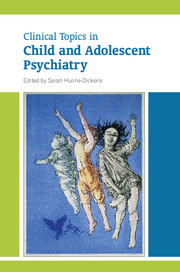Book contents
- Frontmatter
- Contents
- List of tables
- List of boxes
- List of figures
- List of contributors
- Preface
- 1 Child psychiatry and the people who have shaped it
- 2 Fabrication and induction of illness in children
- 3 Personality disorders as disorganisation of attachment and affect regulation
- 4 Post-traumatic stress disorder and attachment: possible links with borderline personality disorder
- 5 Management of antisocial behaviour in childhood
- 6 Pharmacology for attention-deficit hyperactivity disorder, Tourette syndrome and autism spectrum disorder
- 7 Pharmacology for anxiety and obsessive–compulsive disorders, affective disorders and schizophrenia
- 8 Pharmacological management of core and comorbid symptoms in autism spectrum disorder
- 9 Pharmacological treatment of depression and bipolar disorder
- 10 Cognitive–behavioural therapy with children, young people and families: from individual to systemic therapy
- 11 Anxiety disorders
- 12 Somatising: clinical presentations and aetiological factors
- 13 Somatising: management and outcomes
- 14 Evaluating psychological treatments for children with autism
- 15 Attention-deficit hyperactivity disorder: assessment and treatment
- 16 Schizophrenia
- 17 Tourette syndrome
- 18 Sleep disorders
- 19 Self-harm in adolescents
- 20 Adolescent substance misuse: an update on behaviours and treatments
- 21 Eating disorders
- 22 Gender dysphoria in young people
- 23 The psychiatry of children aged 0–4
- Index
20 - Adolescent substance misuse: an update on behaviours and treatments
Published online by Cambridge University Press: 02 January 2018
- Frontmatter
- Contents
- List of tables
- List of boxes
- List of figures
- List of contributors
- Preface
- 1 Child psychiatry and the people who have shaped it
- 2 Fabrication and induction of illness in children
- 3 Personality disorders as disorganisation of attachment and affect regulation
- 4 Post-traumatic stress disorder and attachment: possible links with borderline personality disorder
- 5 Management of antisocial behaviour in childhood
- 6 Pharmacology for attention-deficit hyperactivity disorder, Tourette syndrome and autism spectrum disorder
- 7 Pharmacology for anxiety and obsessive–compulsive disorders, affective disorders and schizophrenia
- 8 Pharmacological management of core and comorbid symptoms in autism spectrum disorder
- 9 Pharmacological treatment of depression and bipolar disorder
- 10 Cognitive–behavioural therapy with children, young people and families: from individual to systemic therapy
- 11 Anxiety disorders
- 12 Somatising: clinical presentations and aetiological factors
- 13 Somatising: management and outcomes
- 14 Evaluating psychological treatments for children with autism
- 15 Attention-deficit hyperactivity disorder: assessment and treatment
- 16 Schizophrenia
- 17 Tourette syndrome
- 18 Sleep disorders
- 19 Self-harm in adolescents
- 20 Adolescent substance misuse: an update on behaviours and treatments
- 21 Eating disorders
- 22 Gender dysphoria in young people
- 23 The psychiatry of children aged 0–4
- Index
Summary
Substance misuse emerged as a relatively common behaviour among Westernised young people towards the end of the 20th century. The trend appeared first in English-speaking countries and, at least in the UK, in a context of deteriorating mental health: national cohort studies reveal ‘a substantial increase’ in emotional and conduct problems in 16-year-olds over a 20-year period (Collishaw et al, 2010). Whether this link with poor mental health is more than coincidental is unclear. However, the substances used may adversely affect maturing cortical white matter, memory, and educational and psychosocial progress during a critical developmental period (Newbury-Birch et al, 2009). In this way they potentially reduce the life chances and perhaps the lifespan (Impinen et al, 2010) of a substantial minority of young users.
Substance misuse is the term used in the UK to refer to patterns of maladaptive use of substances. DSM-5 refers to ‘substance use disorder’, requiring specification of the substance used and, depending on the number of symptoms, whether the disorder is mild, moderate or severe (American Psychiatric Association, 2013). Although it acknowledges ‘a severe state of chronically relapsing compulsive drug taking’, DSM-5 has controversially (Drummond 2011) dropped the term ‘dependence’. This may be more applicable to young people, among whom, some argue, physiological dependence appears to be uncommon (National Treatment Agency for Substance Misuse, 2010).
The epidemiology of the problem
Much of the available epidemiological data on young people still comes from school surveys. UK school survey data show a reduction in numbers reporting being offered drugs and in the proportion reporting ever having tried them: the latter figure fell from 30% in 2003 to 22% in 2009 (Fuller & Sanchez, 2010). Nevertheless, among the 22% of 15-year-olds reporting any use, at least a third are regular users (10% of all boys surveyed and 6% of the girls report use on ‘more than 10 occasions’, indicative of regular use), many or most of whom ‘misuse’. About a quarter of all users (5% of the total surveyed), say that they ‘need help or treatment’. Although drinking also appears to have declined over the past decade, 1% of girls and 2% of boys drink daily, and of those 15-year-olds who drink, 31% of boys and 29% of girls drink 15 or more units per week.
- Type
- Chapter
- Information
- Clinical Topics in Child and Adolescent Psychiatry , pp. 315 - 329Publisher: Royal College of PsychiatristsPrint publication year: 2014



